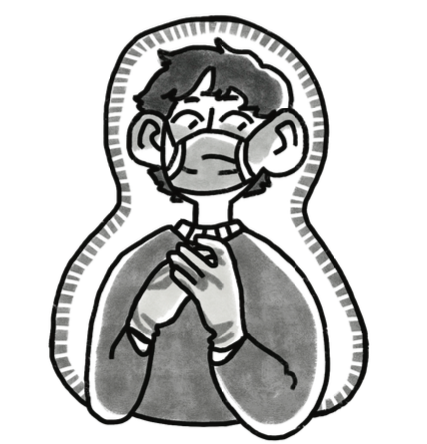
The rapid spread of the coronavirus (COVID-19) has stricken fear into people of all ages across the world, yet it is safe to say that younger people are less concerned than the elderly, as according to the Centers for Disease Control and Prevention (CDC), the virus poses a much larger threat to older populations. Yet, the virus disproportionately impacts individuals with pre-existing chronic medical conditions as well, regardless of age. According to the CDC, people with lung disease, diabetes or heart disease are at higher risk of getting very ill from the virus.
Numerous immunocompromised students live within the Lewis & Clark community, with various conditions and degrees of severity. Importantly, many conditions students have are invisible, meaning that to the naked eye they do not appear to have a disability or illness.
Match Kay ’20 is an immunocompromised student. She explained her condition and symptoms via email.
“I have had recurring pneumonia for a few years, but as a baby I got shingles from my older sister who was in kindergarten when I was one,” Kay said. “She got chickenpox, and it turned into shingles for me, so I was put into a medically induced coma for a few months when I was one, and ever since I get sick with passing viruses, the flu, and pneumonia pretty constantly.”
Due to her heightened susceptibility to illnesses, Kay has taken numerous preventative measures against COVID-19.
“To begin with, I wash my hands about 15-20 times a day, but since all of the news about the virus I have increased that number to probably 30-40,” Kay said. “I have tried to avoid touching everything at school, and when I sit at desks in classrooms I’ve just done my work on my lap instead of on the tables. I don’t use any of the computers on campus because I sterilize my laptop as often as possible and trust it more.”
Tristan Saldanha ’20, another immunocompromised person, explained his diagnosis via email.
“I have a low white blood cell count: I’ve got about 20-25% of a healthy amount,” Saldanha said. “It means I have less ability to fight infections; I get sick more often and for longer than most people do.”
Like Kay, Saldanha is taking preventative measures against COVID-19 very seriously to reduce his risk of contracting the virus.
“I’ve followed the social distancing rules pretty strictly,” Saldanha said. “I started staying in my house for non-essential things on Saturday. It’s a little different from how other people are doing the social distancing because it’ll be a pretty big issue for me once I get sick, compared to most healthy people who will just have to get over it in a few days.”
Many younger people have downplayed the seriousness of the pandemic, like college students across the nation are still gathering in massive crowds on Florida beaches to party over spring break. Yet, it is crucial to remember that numerous young people are immunocompromised, and not practicing proper prevention puts these individuals at higher risk. Disabled Student Union Co-President Sarit Cahana ’20 emphasized how not taking the virus seriously puts vulnerable populations at a higher risk.
“There is a lot of rhetoric dismissing the needs of immunocompromised folks going around, with folks not following social distancing, or saying that ‘they’ll be fine’ so they don’t isolate or wash their hands or saying that ‘it’s not that bad, it only affects old and sick people,’” Cahana said, via email.
Kay commented on the importance of limiting large gatherings, despite this going against social norms in college.
“If anything at this point, students need to be understanding and not pressure people to be social and participate in big events,” Kay said. “Even throwing parties at this point is a bit irresponsible, knowing that folks (who might be immunocompromised) would still feel tempted to gather in big groups.”
Saldanha further emphasized the dire importance of social isolation during this time.
“People need to know that in terms of links between people, they’re only as safe as the least safe thing they do,” Saldanha said. “If you’re ordering food from restaurants, even if you’re getting it delivered, that still links you with the entire kitchen staff and your deliverer, and you’re 2 links away from all those people’s friends and families. If you only hang out with a couple of your friends, but one of them isn’t quarantining at all, your quarantine becomes pretty much pointless.”
Despite social isolation being called for, many immunocompromised people will be in need of help at this time. Cahana stressed the importance of ensuring that supplies reach these vulnerable individuals.
“Many of the resources that are being hoarded are ones that immunocompromised individuals need the most and cannot access,” Cahana said.
If you or someone you know is in need of resources, use the QR Code on page nine and click on “PDX Mutual AID.” That links to a Google Drive folder filled with both local and national resources on COVID-19. The folder includes links to volunteer and request assistance, links to groups and petitions dedicated to the aid of various marginalized communities, tutorials on how to “pod map,” which is organizing the names of others in your community in a visual diagram, and many others.
Subscribe to the Mossy Log Newsletter
Stay up to date with the goings-on at Lewis & Clark! Get the top stories or your favorite section delivered to your inbox whenever we release a new issue.

Leave a Reply